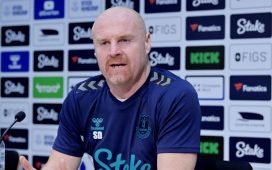
As Brighton players made their way towards the tunnel having been serenaded by their appreciative fans for an exemplary display at the Emirates, they found themselves walking into another set of applause. This one, though, was from the home support.
Some Arsenal fans had left when Neal Maupay re-established the visitors lead. Many more followed when 90 minutes ticked over and the 1-2 beaming back at them off the scoreboard gained permanency with every second.
But for those that stayed – some to boo, others to just stand in disbelief – there came recognition of an organised side deserving of victory. Dare it be said, a side who exhibited qualities recognisable to many in red.
It feels only right to start by talking about Graham Potter. Here was his second 2-1 win at this ground as a manager, the first coming back in February 2018 when he brought Ostersunds FK to north London in the round of 32 of the Europa League.
The result itself was negligible – Arsenal’s victory in the first leg meant they took the tie 4-2 on aggregate – and it would be a reach of Inspector Gadget proportions to suggest Potter took cues from that previous Thursday night to mastermind this success.
1/22 Bernd Leno – 7
Getty Images
2/22 Hector Bellerin – 5
REUTERS
3/22 David Luiz – 5
Action Images via Reuters
4/22 Sokratis – 6
AFP via Getty Images
5/22 Sead Kolasinac – 6
Arsenal FC via Getty Images
6/22 Granit Xhaka – 6
REUTERS
7/22 Lucas Torreira – 6
Getty Images
8/22 Joe Willock – 5
PA
9/22 Mesut Ozil – 5
Getty Images
10/22 Alexandre Lacazette – 7
Getty Images
11/22 Pierre-Emerick Aubameyang – 6
REUTERS
12/22 Matty Ryan – 7
Getty Images
13/22 Dan Burn – 7
Getty Images
14/22 Lewis Dunk – 7
Getty Images
15/22 Adam Webster – 8
AP
16/22 Steven Alzate – 6
Action Images via Reuters
17/22 Dale Stephens – 6
EPA
18/22 Aaron Mooy – 8
EPA
19/22 Davy Propper – 6
REUTERS
20/22 Pascal Gross – 7
Getty Images
21/22 Aaron Connolly – 6
AFP via Getty Images
22/22 Neal Maupay – 8
Getty Images
1/22 Bernd Leno – 7
Getty Images
2/22 Hector Bellerin – 5
REUTERS
3/22 David Luiz – 5
Action Images via Reuters
4/22 Sokratis – 6
AFP via Getty Images
5/22 Sead Kolasinac – 6
Arsenal FC via Getty Images
6/22 Granit Xhaka – 6
REUTERS
7/22 Lucas Torreira – 6
Getty Images
8/22 Joe Willock – 5
PA
9/22 Mesut Ozil – 5
Getty Images
10/22 Alexandre Lacazette – 7
Getty Images
11/22 Pierre-Emerick Aubameyang – 6
REUTERS
12/22 Matty Ryan – 7
Getty Images
13/22 Dan Burn – 7
Getty Images
14/22 Lewis Dunk – 7
Getty Images
15/22 Adam Webster – 8
AP
16/22 Steven Alzate – 6
Action Images via Reuters
17/22 Dale Stephens – 6
EPA
18/22 Aaron Mooy – 8
EPA
19/22 Davy Propper – 6
REUTERS
20/22 Pascal Gross – 7
Getty Images
21/22 Aaron Connolly – 6
AFP via Getty Images
22/22 Neal Maupay – 8
Getty Images
But it all ties in – the experiences, the learnings, the successes and failures – to what Brighton are right now under Potter. A side who have spent the last two seasons surviving relegation scares now looks capable of breaking into the top half of the table. That might sound a tad melodramatic, but not when you evaluate how this result was achieved beyond the visitors not just shaving possession [51 per cent] but also becoming the latest team to out-shoot Arsenal [12 to 20].
During his time at Ostersunds the club developed a “culture academy” where players and staff [Potter included] would perform in front of an audience – sing, dance, act, the lot. The vulnerability of the participants bred empathy and thus greater team spirit. However the biggest takeaway was how to develop comfort in uncomfortable situation. Beyond any am-dram productions on the south coast, that quality was most evident in how Arsenal were bested.
Brighton were regimented from front to back, each player assured in his role and vigilant when without the ball. But they also pressed high and when they attacked they did so through the middle: playing out from their centre-backs and into an established midfield four who trusted each other’s touch and awareness.
They were occasions when, for example, Lewis Dunk failed to thread his passes well enough or Pascal Gross lost sight of the grand plan and, subsequently, the ball. Yet at no point did they waiver as a collective or as individuals. The front two of Maupay and Aaron Connolly either came short or spread wide to provide extra passing lanes when neither full back could get forward.
In return, the service to the front two was high percentage and the lack of speculative hoofs over the top was evidenced by the fact that no Brighton player was caught offside during the entire match. Ultimately, there was no need to when they were able to exploit the space between Arsenal’s midfield and defence. Davy Propper encapsulated this: 30 of his 36 successful passes came in the opposition’s half.
Even the counter-attacks were measured. Any opportunity to break was taken, but if the momentum fizzed then a reassessment followed almost immediately. The player in possession, whether running out of snappy options or having to stutter because of a slightly-off pass, would often check back to settle on making use of territory. It spoke of an inherent belief they were good enough to create further chances.
“It isn’t so easy to do what we did,” stated a satisfied Potter carrying the demeanour of a PE teacher as he sat in the Emirates press conference room in his tracksuit, albeit one who doubles as an A-Level Biology teacher. “But we had to do it well and, whilst we weren’t perfect, we showed enough quality and character to get the win.”
He’s absolutely right, too. Brighton could, maybe even should have been better. And that should excite their fans.
The most obvious area for improvement is up front, but that is more to do with understanding than personnel. Maupay, the match-winner, and Connolly, whose presence in the box facilitated Andy Webster’s opener, spent as much time chastising one another as they did combining.
Both were guilty of getting into key positions and either choosing the wrong option or not going for the right one early enough. There appears to be a natural rivalry between the two – the sort all good strike partnerships thrive on. That’ll flourish further when they actually click.
What makes this victory all the more impressive is that it comes off the back of three successive defeats. If there was a time for Brighton and Potter to wonder if they needed to change their ways, it was here as they dropped from eighth to 16th and starting Thursday just one point above the relegation zone.
But across the 3-1 at Old Trafford, 0-2 at home to Leicester City and Sunday’s 2-1 against Liverpool there was enough beyond the scoreline to maintain their methods on Thursday to give them a four-point cushion. And perhaps this was the most telling difference between the two sides even before Thursday night.
Trust in the process means Brighton can draw strength even in defeat. For Arsenal, listless and steadily losing its identity under Unai Emery and now Freddie Ljungberg, there is nothing but misery.














